The New Network Effect
How the United States let a million people die to protect network ratings.
Last week I had COVID-19, the Omicron variant I assume. It sucked for a couple of days and now it feels like a head cold. Being laid up gave me time to ponder why my wife and I had chosen to be vaccinated and boosted. It didn’t occur to us to question the science, yet I know others, some of them well educated, who still resist vaccination. I’m pretty sure the answer to their resistance lies with the new network effect.
In 1976, the movie Network closed with the following line — “This was the story of Howard Beale who was the network news anchorman on UBS-TV, the first known instance of a man being killed because he had lousy ratings.” I enjoyed that movie when I caught it on reruns (I’m not quite that old) but the idea that someone could die because of poor ratings seemed a big stretch. Back in ’76 when someone said network, it pretty much meant TV network. Now you could be talking about a computer network, a social network or maybe the economic value of the network effect. What’s not a stretch today is the idea that people die to protect ratings or network share.
COVID-19 will end up killing over one million Americans. Some reliable estimates indicate we have passed that point already. Was it inevitable that COVID-19 was going to kill some of us? Yes. Did that number have to be one million? Not by a long shot. Masks, social distancing, and when they were available, vaccines could have prevented most of those deaths. By June of 2021 the stats showed that 99% those still dying were unvaccinated. As of January 13th, 2022, the seven-day rolling average for US COVID deaths was 1,730. Even if we assume five percent (a generous assumption) of those dying are vaccinated, that’s still 1,644 unnecessary American deaths each day.
It’s not unusual for a crisis to garner a difference of opinion on the appropriate response. But whether it was our reaction to the Spanish Flu, Pearl Harbor, or 9–11, Americans in the most part have come together in our response to tragedy or calamity. What changed this time? Why has this crisis triggered such division? Why are so many still dying when the objective data from credible sources should be undeniable? But that’s just it. We now live in a world where for many, no data is undeniable. The opinions of like-minded peers have become fact and the research of the academically qualified is treated as conjecture. And that is the new network effect.
I know that I’m subject to the network effect. I realize that the artificial intelligence algorithms at Facebook, Twitter, and Instagram are trying desperately to provide me with content that jibes with my world view. When it comes to promoting links to alternative rock from the 80’s, that’s fine. I also applaud the ability of social media to expose lies, cover-ups and propaganda used to bury truth. But when it comes to news, particularly news that could affect my continued existence, I’m hopeful that ABC, CNN and the BBC are giving me facts, not protecting me from anything that might offend my sensibilities and minimize my screen time with them.
But that’s the problem, isn’t it? People (myself included) are inherently lazy. We don’t want to exert effort to hunt for facts. We want them fed to us in palatable, bite-size pieces. In 1976 you might have enjoyed going to the movies to watch Network and it might have even made you think. But the next evening Walter Cronkite didn’t filter the CBS news to fit your personal biases.
I wish I had an easy answer to the downward spiral of the new network effect. Is it education — a need to instill critical thinking in every curriculum? Is it regulation — aggressively cracking down on those who present opinion as news? Is it abstinence — giving ourselves a regular time-out from our addiction to the opinions of others? Maybe it’s a mix of all three. I know that if we do nothing, when the historians of the twenty-second century write their assessments of how the United States handled the COVID-19 pandemic, they will close with — “This was the story of the United States, the first known instance of a million people being killed to protect network ratings.”
